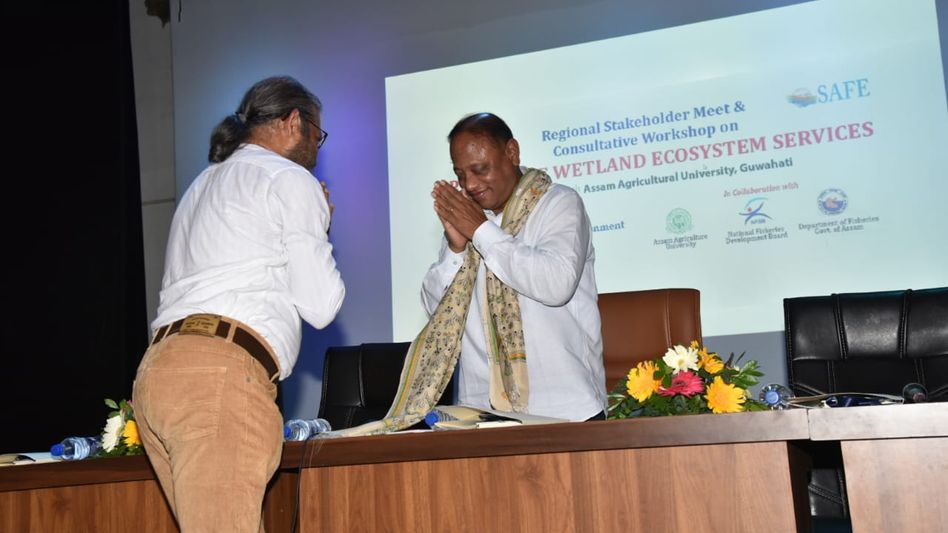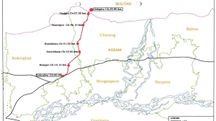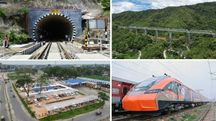'Wetland ecosystem services are of paramount importance for poverty alleviation, food and livelihood security for marginal poor': Parimal Suklabaidya
 'Wetland ecosystem services are of paramount importance for poverty alleviation, food and livelihood security for marginal poor': Parimal Suklabaidya
'Wetland ecosystem services are of paramount importance for poverty alleviation, food and livelihood security for marginal poor': Parimal SuklabaidyaMinister Parimal Suklabaiya today inagaurated the regional stakeholders' meet and consultative workshop on ‘Assessing the price of weltland ecosystem services’ at the Assam Agricultural University on Saturday.
He stated that "Conserving the goods and services of wetlands and sustainably intensifying the wetland ecosystem services are of paramount importance for poverty alleviation as well as food and livelihood security for marginal poor segment of the society'.
On the eve of World Environment Day, SAFE in association with Progyan Foundation for Research and Innovation (PFRI) organised the Multistakeholders' Workshop for engendering a platform in sync with the prevalent policy and schemes of Mission Amrit Sarovar for maximising the benefits of stakeholders through multifaceted convergence.
He further added that, the overall mission is very much aligned with the Prime Minister's ‘Mission Amrit Sarovar’ for preservation and restoration of wetlands and sustainable use of their resources by maintaining their ecosystem services.
"In the milieu of the climate crisis, the wetlands can be a boon to mankind and the importance and significance of the wetland ecosystem services have been equitably highlighted in the recent state program, ‘Mission Amrit Sarovar’ launched in Assam by Hon'ble Prime Minister. We would like to carry forward the essence of this scheme by reviving and rejuvenating the existing water bodies through multipurpose usage for water supply, irrigation, fisheries, and recreational activities," Suklabaidya added.
He exuded the optimism that the workshop would go a long way in building regional preparedness in northeast part of the country by developing capacities in scientific, economic and socio-political planning approaches on the pricing of ecosystems.
Delivering the keynote address, Senior Scientist, South Asian Forum for Environment, Dr. Malancha Dey said the significance of ecosystem services (ESs) in global policy has been evident in Paris Agreement, emerging REDD+ and initiatives like Aichi Targets, and SDGs. "FAO (2019) reported that lack of ecosystem services valuation has led to over-exploitation of resources and poorly informed decisions in countries of Asia Pacific. In the climate milieu, a fundamental plea for plural values of ESs will be imperative. SAFE has extensively worked over the wetlands in eastern and north-eastern parts and has an edge over others, having worked at the community-ecosystem interface," he said, adding that SAFE has successfully worked on the Deepor Beel Ramsar site and in Majuli river island to facilitate adaptive learning over time and space.
"Wetlands are vital for human survival. They cover a total area of 12.1 million km2 and account for 40.6% of the total global ecosystem services value. Wetlands are acknowledged as both critical for ES delivery and highly threatened by a range of human activities which has resulted in a 35% loss in the global wetland extent since 1970. 5% of the total geographical area is nearly 15 million hectares is wetland in India, of which 42 Ramsar wetlands cover only 1.07 million hectares and the rest designated wetlands cover another 1.3 million hectares, are conserved and host the livelihood of nearly 4.8 million people, mostly indigenous marginal fishers and farmers," Dr.Dey added.
"Since the ecosystem services of these wetlands are not priced to have their contributions recognised in the Gross Development Products (GDP) of the nation, these wetlands are often neglected and fall victim to urbanisation and encroachments. We are losing 25 sq.km of wetlands per 1 sq. km of urban built-up area. This is 4.2 times faster than the loss in forest cover. Not only livelihood of poor communities or biodiversity is being protected by the wetlands, but the carbon sequestration potentials of wetlands are also 12 times more than the forests. Ecosystem services for the poor from wetlands are four-fold more than forests, whereas 40% of the world’s biodiversity (genetic resources) is housed in wetlands," said the Senior Scientist from SAFE.
Dean, College of Fisheries, Dr. BK Kalita also spoke on the occasion.
Chairman Pollution Control Board, Assam, Arup Kumar Misra, Additional PCCF Biodiversity, Assam, Pawan Kumar, Dean Assam Agricultural University, Member Secretary, Assam Pollution Control Board and other officials were also present.
The workshop, a deliverable of a project funded by Asia Pacific Network (APN), Japan aims at formulating a sustainable economic model for all the important ecosystem services which are provided by the environment free of cost. Apart from this project, the scale up phase of Global Development Network (GDN) will also be implemented in coming years with prime focus on sustainable aquaculture and agriculture.
Copyright©2026 Living Media India Limited. For reprint rights: Syndications Today









